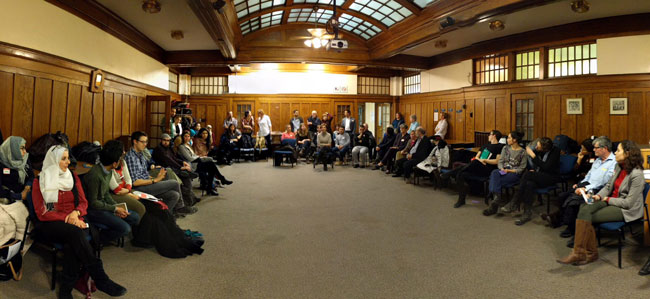
Last night close to 80 people got together at the School of Social Work to try to better understand each other in the aftermath of the horrific shooting at the Centre Cultural Islamique de Québec, a Quebec City mosque, that left six men dead and 19 injured.
Entitled Conversations with Muslims, the event began with a minute of silent reflection. Those present bowed their heads in memory of the men who were gunned down at the mosque, before forming small groups of 6-7 people to ask questions about Islam of volunteers from McGill and from the wider community.
Nico Trocmé, Director of the School of Social Work, started the proceedings by telling those assembled that the event was an opportunity to conquer hate and fear through better understanding.
One of the organizers, Ehab Lotayef, is Muslim and an Information Technology services manager at McGill, as well as a published poet. He told the group “There has been a huge outpouring of support for the Muslim community, and a desire to build bridges. We thought an event allowing people to just talk to each other could be helpful. We know there are people on campus who attend class with Muslim students and do not interact with them. We want to create a safe place where people can just talk to each other. There are no experts here.”
The MC Tali Goodfriend told the crowd “To insure that this is a safe space and that the atmosphere remains friendly and respectful the main guideline of the evening is that whatever is said here remains here (especially when we break up into small groups), so that everyone can ask and respond in a candid manner and express themselves without inhibition.”
Every small group included one Muslim person, or responder, and one moderator.
Organizers asked participants to use the principles of active or compassionate listening. That means, among other things, one speaker at a time, no cross speaking between participants, questions should come from a place of wanting to learn, have a clear focal point and respect the time allotted.
Amal El-Sana is the head of the International Community Action Network and a PhD student in the School of Social Work.
El-Sana said as social workers it is important to do something useful in the wake of a tragedy like the murders at the Centre Islamique de Québec. “It is important to break down ignorance about Islam because ignorance breeds fear which can lead to hate which in turn can lead to violence. In these days of the internet when there is so much information, ignorance is a choice. But we can also choose not to be ignorant. This is a chance to build bridges and to be brave enough to say ‘I don’t know.’”
Flags were at half-mast for days across Quebec and right across Canada, and there was real grief across the country and around the world in the wake of the shooting at the mosque. “We were attacked because we are Muslim. Shot at point blank range because we are Muslims. Dead because we are Muslim,” said a statement issued by the Centre Culturel. The Prime Minister of Canada condemned the murders as a terrorist attack. The suspect is a 27-year-old Laval University student Alexandre Bissonnette.
